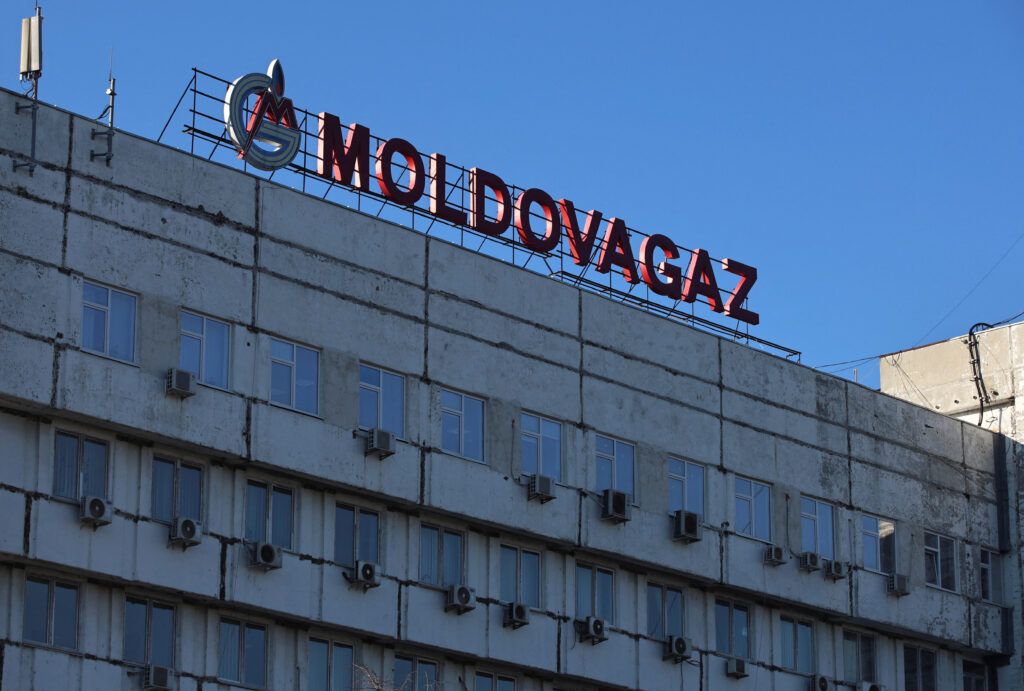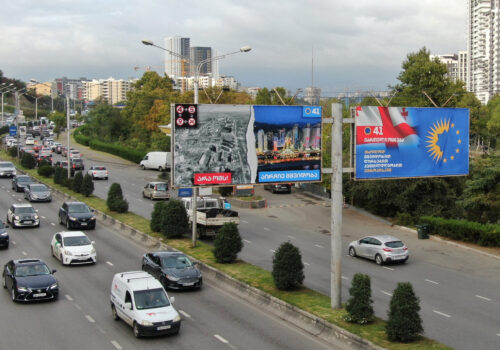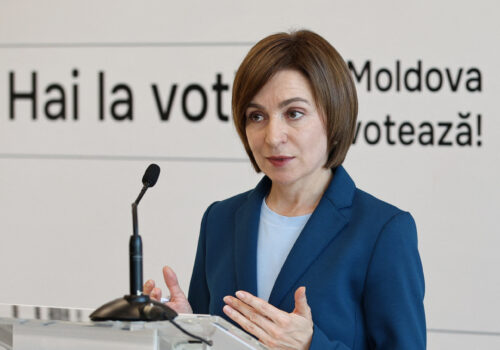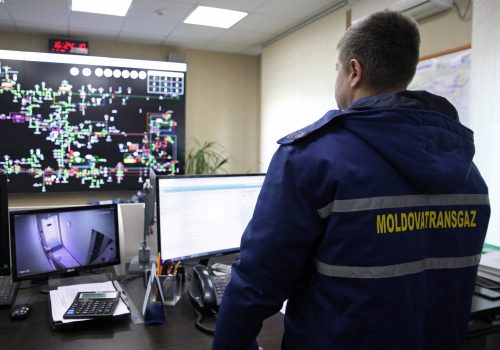A combination of circumstance, Russian malign influence, and its own failure to prepare has left Moldova the country hardest hit by the end of Russian gas transit through Ukraine. Upon the January 1, 2025, cessation of transit, Moldova finds itself in an energy crisis and facing political instability. The Russian-backed separatist region of Transnistria is experiencing major power cuts and is without an alternate source of gas, having rejected bailout offers from the European Union (EU) and Chișinău. The rest of Moldova is suffering from its reliance on Transnistria for electricity, as well as Chișinău’s consolidation of its gas market under the majority Russian-owned company Moldovagaz. Neither the Moldovan government nor Transnistria were prepared for the long-anticipated post-Russian gas transit reality.
The five-year natural gas transit contract between Russia’s Gazprom and Ukraine’s Naftogaz expired on January 1, ending a long history of Russian gas reaching Europe—and Moldova’s 2.5 million citizens—through Ukrainian pipelines. Kyiv elected not to extend the contract because, although it was earning approximately $800 million per year in transit revenue, Moscow was earning billions of dollars from the post-invasion residual annual transit of 15 billion cubic meters of gas, which was funding its ongoing assault on Ukraine. Hungary and Slovakia, which are both highly dependent on Russian gas, will be impacted, but it is Moldova that has been dealt the greatest blow.
While Moldova’s lack of preparation for the end of Russian gas transit is in large part responsible for the country’s current predicament, the Kremlin’s war on Ukraine is the principal cause of the current crisis. Amid Russia’s ongoing aggression, Chișinău and the European Union must work to find a way to stave off Moldova’s energy emergency and the looming humanitarian crisis in Transnistria, which risks further destabilizing the region. To break this cycle of annual energy crises in the future, Moldova will need to make concrete, meaningful reforms to its energy sector, which is the only way to diminish Russia’s leverage over the country.
A state of emergency
For Moldova, the end of Russian gas transit exacerbates both a rapidly deepening energy crisis and an ensuing political crisis. The official Moldovan government in Chișinău prospectively declared a state of emergency over energy concerns on December 13 and has instituted energy saving measures, such as dimming lights in public and commercial buildings by 30 percent. Transnistria, located on the “Left Bank” of the Dniester River and administered by the internationally unrecognized Transnistrian government, also declared a state of emergency, and all nonagricultural industry in the region has been shuttered. It has also set up communal heating centers and is helping residents find firewood.
But whereas Moldova proper, on the “Right Bank” of the Dniester, can import both electricity and gas from Europe—at a massively higher price than it was paying for Russian gas—the Left Bank has refused offers of in kind aid, including humanitarian aid and generators, as well as financial support from Europe with which to get through the winter. Buoyed by foreign assistance funds, Chișinău offered to help Transnistria buy gas and power imports from Europe, but the Left Bank has thus far declined any assistance. Instead, Transnistria seems to be waiting for Russia to turn the gas taps back on. Meanwhile, its lights are off and its 450,000 residents are expected to grow restive in the dark and cold.
Failure to prepare
This situation is years in the making. Moldova is one of the world’s most energy insecure countries and has long been reliant on Russian gas transited through Ukraine. Despite Moldova’s declaration of independence at the fall of the Soviet Union and much more recent disavowal of Russian gas, Russia’s majority state-owned gas giant Gazprom owns a 51 percent stake in Moldova’s state-owned gas company, Moldovagaz, and it has remained the country’s sole source of gas, whether directly or indirectly supplied. Following Russia’s full-scale invasion of Ukraine in 2022, Moldova took some steps to reform its energy sector, such as unbundling its gas transmission system to Romania’s Transgaz. However, Moldova simultaneously consolidated all gas distribution under Moldovagaz, forcing Western companies out of the market. Gas imports from non-Russian sources are possible, but they are few and mostly consist of Russian gas acquired via alternate routes. And Moldova lacks a viable market with which to attract private companies into the mix. In recognition of this, Moldova’s then energy minister, Victor Parlicov, traveled to Moscow in November 2024 to seek warmer energy relations with Russia.
Meanwhile, Transnistria houses Moldova’s only power plant, the Ciciurgan gas-fueled station, which it sold in 2004 to a Russian state-owned enterprise. Chișinău does not recognize the sale. Although Moldova has been importing some electricity from the EU, it is nonetheless dependent on Transnistrian electricity for about 70 percent of its needs. Moreover, the only high-voltage transmission line through which Moldova can import European electricity passes through Transnistria, although a new transmission line to Romania is currently under construction. In practice, this means that the Right Bank depends on the Left Bank for power, and the Left Bank depends on the Right Bank for the gas to generate that electricity. Historically, each has found this arrangement convenient for less than strictly above-board reasons. It was also a very affordable arrangement so long as Russia was providing the gas, so both sides have therefore long been dependent on Russia.
Russia, for its part, has made regular use of this leverage. The Kremlin has been waging a campaign to keep Transnistria—where just under half the residents hold Russian citizenship and are native Russian speakers, and which houses about 1,500 Russian soldiers—within its aegis and to destabilize Moldova. Energy has been its primary tool. Gazprom supplied gas to the Left Bank via Moldovagaz for free for years before presenting the bill to Chișinău. Gazprom asserts that the approximately €700 million value is a debt owed by Moldova and is using this as a justification for stopping gas supplies. (Chișinău says the debt is €8.6 million.) And any political instability born of blackouts or the inflation that buying energy on EU markets will cause is a bonus that will help the Kremlin undermine Chișinău and thereby hurt Moldova’s already shaky chances of joining the EU.
Although this situation could not have been avoided given Russia’s meddling in Transnistria, it was predicable, and Moldova could have been better prepared. Moldova’s prior annual energy crises are evidence of the foreseeability of this one, and the date of the end of Russian gas transit was well known. Ukraine’s previous bailouts of Moldova during those regular winter crunches could also have provided a template for managing this crisis even if Ukraine’s own energy crisis, caused by Russian bombing of energy infrastructure, has left Kyiv less able to support Moldova again this winter. Moldova could have built its own power station years ago to liberate itself from Transnistrian electricity supply. It could have used some of the more several billion euros in foreign assistance it has received since 2022 to develop an energy market that attracted foreign investment, including into natural gas supply diversification and distribution. It could have worked to break Moldovagaz’s monopoly instead of reinforcing it, which has helped Gazprom maintain leverage. The failure to take these steps has left the country few options for enhancing its energy security, and the current situation is the consequence.
Regardless of opportunities lost, however, the immediate cause of the crisis is Russia and its aggression in Eastern Europe. Neither the EU nor Kyiv can afford to let Moldova collapse in a wave of Russian-fomented unrest, given that it borders Ukraine and is situated in continental Europe. Most likely, EU aid will support Moldovan gas purchases through this winter. In the immediate term, Chișinău will be bailed out again.
In the medium to long term, however, Western governments must condition aid to Moldova, requiring that it makes meaningful reforms to its energy sector to avoid repeat crises every winter. To weaken Russia’s leverage, these reforms should include energy market development, concrete market liberalization, rule of law adherence, and respect for contracts. Most urgently, breaking Gazprom’s majority hold over Moldovagaz is a prerequisite. Without these reforms, the cycle of Russian energy aggression and Moldovan energy crises will continue. And if Chișinău and Brussels cannot convince Transnistria to accept energy assistance—and soon—then the continent should prepare for yet another Russian-caused humanitarian and political crisis.
Suriya Jayanti is a nonresident senior fellow at the Atlantic Council’s Eurasia Center.
Further reading
Thu, Oct 24, 2024
Moldovan and Georgian elections highlight Russia’s regional ambitions
UkraineAlert By
Russia is playing a key role in elections currently underway in Moldova and Georgia, underlining Moscow's determination to retain its regional influence despite challenges created by the invasion of Ukraine, writes Katherine Spencer.
Mon, Oct 21, 2024
Five questions (and expert answers) about Moldova’s elections
New Atlanticist By
Moldova narrowly voted to add the goal of EU membership to its constitution, and pro-Western President Maia Sandu advanced to a runoff. Our experts interpret the results and preview what's coming next.
Tue, Oct 3, 2023
Mixed messaging from Moldova on energy sector reforms
UkraineAlert By Suriya Evans-Pritchard Jayanti
Recent steps by the Moldovan authorities cast doubt on Chisinau’s commitment to energy market liberalization, escaping Russian energy dominance, and anti-corruption imperatives, writes Suriya Jayanti.
Image: An installation with the logo of Moldovagaz energy company is on display on the roof of a building in Chisinau, Moldova, December 31, 2024. REUTERS/Vladislav Culiomza.



